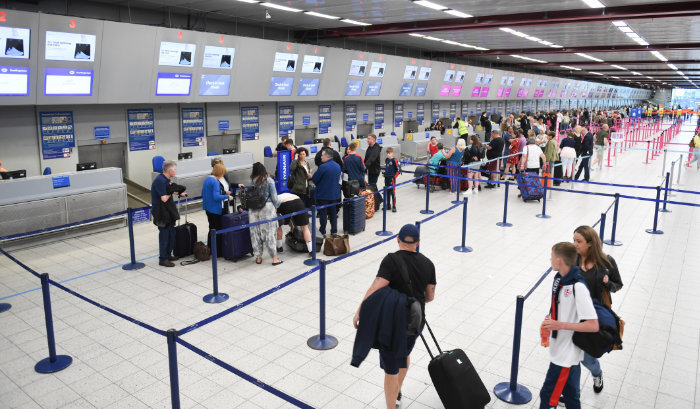Another hurricane has formed in the Atlantic—this one is named Larry. It is currently a category 3 with winds over 70 miles per hour. It will swerve away from the East Coast of the US, but could cause larger than normal swells to hit the entire Eastern side of North America.
Employers are still hiring, but the hiring spree is slowing down. Leisure and hospitality industries are struggling again because of the impact of Delta:
U.S. employers added just 235k jobs in August, a dramatic slowdown in hiring. The unemployment rate fell to 5.2%.https://t.co/ByfagmylG7
— Ben Casselman (@bencasselman) September 3, 2021
In “feel good” news, neighbors ding-dong-ditch sick neighbors and leave behind a porch full of groceries and stuff to sooth what ails ‘em. The world needs more of this kind of kindness.
I’m keeping my ears to the rail on rumors that materials necessary for the replacement of transformers (among other things) are difficult to come by right now. Should more hurricanes and tornadoes cause electric utilities damage, outages could last longer than anticipated…
When truckers strike, shelves will go bare FAST. Sadly, truckers Down Under are striking against imposed COVID mitigation measures. Here’s what the damage looks like after a trucker’s strike in Australia:
Australia….. pic.twitter.com/xTqpJ8GaZ7
— Juststeveisfine (@juststeveisfine) September 5, 2021
Nearly 9 million people will lose federal unemployment benefits this week as the COVID safety nets that were once in place get pulled back.
The world has over 221.9 million COVID cases. The world has gained 4.1 million cases in the last week. There have been nearly 4.6 million deaths in total. The US has a cumulative 40.9 million cases. The US gained 1 million cases in the last week. Over 666,000 Americans have died. The US gained over 44,000 new cases on Sunday, and over 36,000 by late afternoon Monday. The US appears to be over the most recent Delta peak in terms of new daily cases, but over 1,000 people are still dying per day based on a 7-day average. The US, India, Brazil, and Russia currently have the highest daily case gain in the world.
Work on oral treatment formulations for COVID is still ongoing—and as we’ve seen with the Ivermectin debacle, people seem to prefer a medication they can consume over more invasive shots:
Success against #COVID19 will likely require both vaccines & treatments. We’re pleased to share we’ve started a Phase 2/3 study of our oral antiviral candidate—specifically designed to combat SARS-CoV-2—in non-hospitalized, low-risk adults: https://t.co/su5VtfbWPX
— Albert Bourla (@AlbertBourla) September 1, 2021
The UK is not going to recommend COVID vaccines for healthy youth under age 15. This is maddening to me because the risks of the disease are still higher to children than the risks of getting the vaccines. I don’t agree with this choice, and am thankful that US policymakers don’t either.
Florida now has more daily deaths than previous peaks—a clear indication that policies actually matter. Speaking of which, 15 educators in the Miami-Dade area died in just 10 days:
Almost 25% of daily US COVID deaths are in Florida. This wave is striking because it is pretty hard to go above pre-vaccination waves. It's almost double.
Thankfully has not happened in any other state. In fact, very few countries have had this happen either. pic.twitter.com/d8wrIAj2oX
— Vincent Rajkumar (@VincentRK) September 6, 2021
The Mu variant is in Los Angeles County:
COVID-19 Mu Variant Potentially Able To Evade Vaccines And Is Present In LA County, Health Officials Say https://t.co/J5KKvWNajV
— KCAL News (@kcalnews) September 4, 2021
Sweden has banned travelers from the US, but since we seem to coming down from the most recent peak, this could be reversed soon.
Here’s a useful dashboard website that shows the acceleration/deceleration of COVID case growth in each state over time:
Visualizing how fast the pandemic is getting better or worse, state by state
Explore our new dashboard from @jaspar here: https://t.co/aYJ4oSqh1C pic.twitter.com/tjDcmous2t
— STAT (@statnews) September 6, 2021
Long COVID is scary. People with 2 or more vaccines are at lower risk for Long COVID:
Emerging data for reduced risk of long #COVID19 symptoms in vaccinated.
"The risk of long COVID is reduced in individuals who have received double vaccination, when additionally considering the already documented reduced risk of infection overall."
Link: https://t.co/gdDHVvyb86 pic.twitter.com/61ozz2LxC4
— Isaac Bogoch (@BogochIsaac) September 2, 2021
When accounting for underreporting and excess mortality, the actual estimate of global COVID mortality is more than three times the current official number:
The Economist journalists updated their a model of the true death toll of the pandemic, corrected for underreporting.
They come to the conclusion that 15.2 million have died, more than 3-times the official toll of 4.6m.
This map shows the distribution of the death rate. pic.twitter.com/8ZMdm7LmzY
— Max Roser (@MaxCRoser) September 4, 2021


You are reporting the comment """ by on